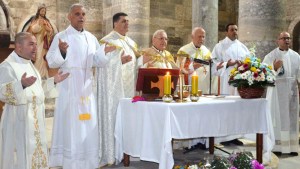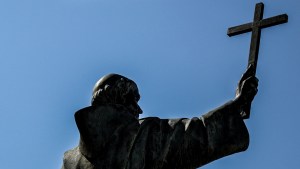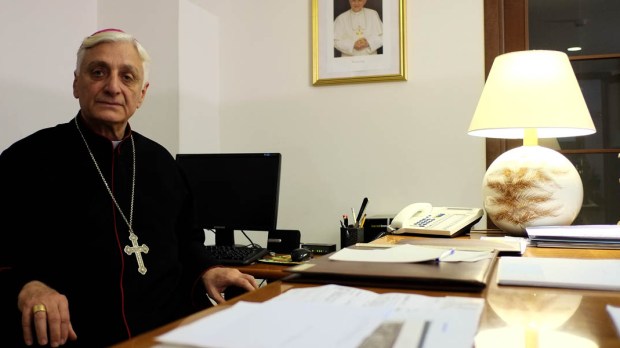Bishop Antoine Audo leads the Chaldean epharchy of Aleppo, one of the oldest Christian communities in Syria, and served the Syrians during the six years of war as president of Caritas. Today, he wants to continue serving his country.
The Chaldean Church is one of the most harshly persecuted Eastern Catholic Churches in Syria and Iraq. The pope received its representatives in an audience on February 5, 2018, on the occasion of their ad limina visit. What did you discuss during your interview with the Sovereign Pontiff?
We addressed many challenges, and we also expressed our sufferings and difficulties. Of course, there was a lot of talk about the Arab-Muslim world: what is happening and the answers we have to offer it. And of course, the question of Daesh [ISIS]. We were really impressed by how much the pope knew about all these issues. He follows things very closely.
How was your conversation?
I was really struck by his listening and his closeness. At one point, our Patriarch found that we had already gone over time with him. He then began to thank the Holy Father so that we could leave. Usually, it is the pope who gets up and dismisses people. But Pope Francis replied, “If you still have questions to ask me, take your time. I am in no rush.” This availability, this listening is quite striking. What touched me most was his truthful language: he speaks freely and does not surround himself with protocol or prohibitions. He expresses himself as he thinks, frankly and without fear of tackling the problems. This is really a big novelty for a Roman pontiff.
Did he tell you that he wanted to come, especially to Syria and Iraq?
The Iraqis told him they would like him to come to Iraq. A bishop even told him that all the countries in the Middle East were visited by a pope, except for Iraq! Like John Paul II, who came to us, to Syria, to Damascus. I did not invite him to Syria because I believe that the priority right now is Iraq, and it’s too difficult for him to come, even if he wants to. It’s a question of security, in a context of war.
If the situation improves, which cities could he visit?
First Damascus, as John Paul II did in 2001. It’s the capital, it’s St. Paul. It is also where there are the most Christians now. When the Polish pope came, we also had the hope that he would come to Aleppo because it’s a city with a very old Christian presence. But that didn’t work out because there were too many threats to his security. Traditionally, Aleppo had the highest concentration of Christians with its communities and its history, and with the churches and bishops. But since the Syrian independence in 1946, and until now, people have flocked to Damascus, just as it happened to Baghdad, with the Chaldeans who came from the north. The capital’s universities attract people, as do the jobs.

Read more:
The pope does not forget us, says bishop of the displaced Nineveh Plain Christians
At the end of the war, can we say that ISIS has been definitively beaten?
On March 15, 2018, it will be seven years. In recent times, we have had several meetings in different dicasteries in Rome. During one of them, I was struck to hear a diplomat say that on the one hand, Daesh [ISIS] had been defeated, but on the other, it did not mean that Muslim fundamentalism was defeated. It may resurface in another way because there are other extremist trends in Islam.
In Syria, is it still possible to testify to one’s Christian faith?
Yes, I believe so. We did a lot during the war. I was president of Caritas-Syria for six years. I believe that one of the benefits of this war is that many Muslims have discovered the genuine charity of Christians. And they recognize it.
Peaceful relations had been possible between Christians and Muslims in Syria. Is this still the case today?
On the one hand, Muslims hold us in higher regard. Their perspective has deepened. Muslims have discovered among Christians quality citizens: people who do not sell out their country, who are not self-serving. Christians have not exploited this war as others have done, like Daesh [ISIS], Al-Nusra, and all these extremists. Unfortunately, on the other hand, some of the Christians were let down, even horrified by the behavior of these extremists. We were not expecting this level of violence, this destruction, for selfish interests. Christians were disappointed, but Muslims admire Christians more. It’s paradoxical, but it’s the reality. We will have to rebuild that trust.
Does interreligious dialogue still exist in Syria?
Interreligious dialogue does not exist in its Western form. We have several levels of dialogue. In the first place, there is the dialogue of life: we live together, at school, at the university. It’s being a good neighbor, mixing together. We are friends: we visit each other, we help each other. But the most difficult is the theological, dogmatic dialogue. And this one, in my opinion, need not be avoided but it is better left to the specialists. Otherwise, it is useless and we fall into the superficiality, irony, or even aggression. Instead, we encourage the dialogue of life, the development of friendly understanding, mutual respect, all the while being truthful, by telling the truth, by being sincere with the other person.
A few days ago, a Mass was celebrated in a ravaged church in Deir Ezzor. Is this a sign of hope returning?
It is very symbolic to celebrate Masses in such places. At Deir-Ezzor we had a small Chaldean presence, about 50 families. Before the events, I went there every year for a pastoral visit. Today, there is nothing left, everyone has gone. In Aleppo, another example, there is a church — the cathedral of the Maronites — that was completely sacked. The Maronites invited me to pray with them. Our Patriarch returns from time to time to the plain of Nineveh for celebrations in the destroyed churches. These are gestures of hope to say that we want to stay in spite of the difficulties. As for our cathedral, in Aleppo, which is next to a big mosque, it was spared because of its position. But many families and young people are gone. That too is destruction; it is suffering.
Are Christians more willing now to get involved in politics? Are they welcome?
Christians continue to get involved. They are always honored to be able to serve and put their skills at the service of the country. Bashar al-Assad has appointed five Christians to very important posts, especially the Ministries of Higher Education, Health, and Economy. Traditionally, there have always been three or four in these positions. After everything that has happened, now there are five! The new Speaker of Parliament is also Christian. It’s a real political message.
What is your conviction for the future?
First of all, the Christian presence in Syria and the Middle East is very valuable, both for Eastern Christians and for the universal Church. This is the cradle of Christianity. Then, for me, the Christians of the Middle East, these Arabic-speaking Christians, testify to a great capacity for dialogue and reflection. As Pope Francis points out, we cannot imagine the Middle East without the Eastern Christians. And I will continue to serve the Church to give them to it.

Read more:
The saint who died bringing Christians together in the Middle East

